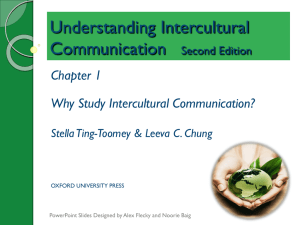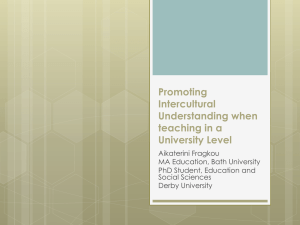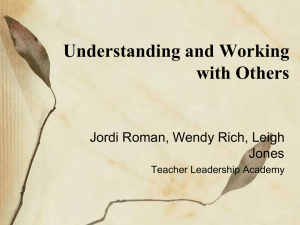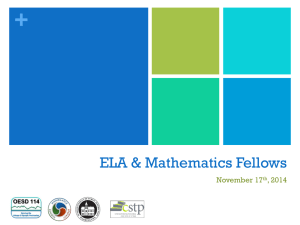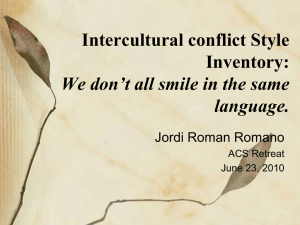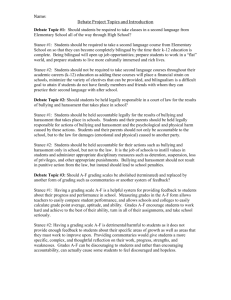Paper 8 - (ILTLP) Project - University of South Australia
advertisement
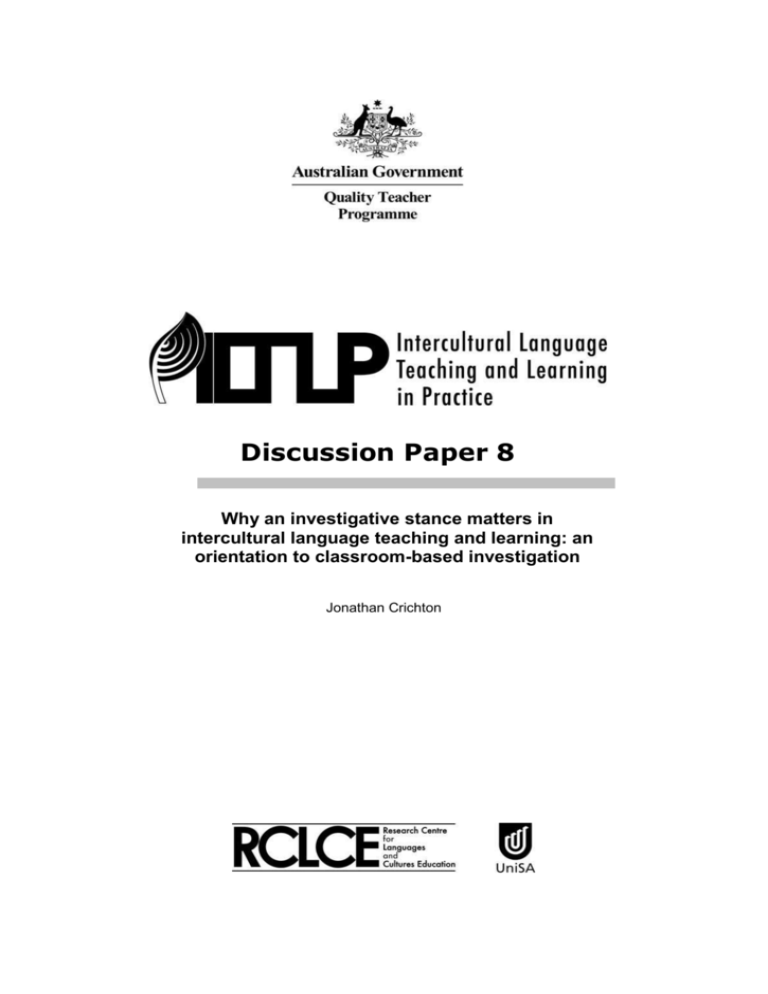
Discussion Paper 8 Why an investigative stance matters in intercultural language teaching and learning: an orientation to classroom-based investigation Jonathan Crichton © Commonwealth of Australia 2007 This work is copyright. It may be reproduced in whole or in part for study or training purposes subject to the inclusion of an acknowledgment of the source and no commercial usage or sale. Reproduction for purposes other than those indicated above, requires the prior written permission from the Commonwealth. Requests and inquiries concerning reproduction and rights should be addressed to Commonwealth Copyright Administration, Attorney General’s Department, Robert Garran Offices, National Circuit, Barton ACT 2600 or posted at http://www.ag.gov.au/cca. Disclaimer The views expressed in the publication do not necessarily represent the views of the Australian Government Department of Education, Science and Training. Acknowledgment This work was funded by the Australian Government Department of Education, Science and Training under the Australian Government Quality Teacher Programme (AGQTP). Discussion paper 8 Why an investigative stance matters in intercultural language teaching and learning: an orientation to classroom-based investigation Jonathan Crichton Module 5 introduces the idea of classroom-based investigation. It may be natural to think of classroom investigation as something which can only happen ‘in addition’ to teaching and learning, something which can only be done after the learning needs of students have been met. Understood in this way, classroom investigations are not only seen as intrusions on teaching and learning in an already crowded curriculum, but also as requiring the teacher to take on the additional role of a researcher. Moreover, traditional approaches to educational research have been difficult to apply to classroom practice (Hopkins 2002:35), and when teachers do conduct classroom research, this is often with a view to completing a particular project within an action research paradigm (Burns 2005). This discussion paper promotes a different view. It seeks to develop the idea that classroom investigation can be an integral part of teaching and learning, an ongoing ‘stance’ which enables us to gather valuable information about teaching and learning which may otherwise go unnoticed. This information can in turn inform how we understand and develop intercultural language teaching and learning for our students. Developing an investigative stance can be understood as an elaboration of processes associated with good teaching. This emphasis on the value of investigating classroom practice has a history in education that can be traced back at least four hundred years (Hubbard & Power 1999:5). Teaching necessarily involves being alert to what is going on in the classroom, noticing developments and changes, attending to emergent needs, comparing achievements at one point in time with what has happened before and what might happen after, reflecting on teaching practice and assessment, evaluating activities and plans, developing and drawing on curricula, and the host of other activities that contribute to effective teaching practice. Of course these activities do not happen in isolation; they inform each other through the lesson, the day, the week, and over the longer term, acknowledging the perspectives and changing needs of students, teachers and members of the broader school community. Taken together these activities involve noticing, analysing, interpreting and making sense of the actions of teachers and learners, motivated by an ongoing interest in using information about classroom interactions to develop teaching and learning. It is this orientation that is referred to as an ‘investigative stance’ - not as a ‘noun’, an ‘add on’ to teaching and learning, but ‘adverbially’: a way of doing teaching, of being alert to interactions, in which teachers continuously notice, compare, reflect on and apply information about teaching and learning back into how they do and how they understand teaching and learning. That this stance is a natural extension of good teaching is underscored by Burnaford, Fischer and Hobson (2001): Effective teaching is informed by personal knowledge, trial and error, reflection on practice, and conversations with colleagues. To be a teacher means to observe students and study classroom interactions, to explore a variety of effective ways of teaching, and to build conceptual frameworks that can guide one’s work (p 29). In the broadest terms this stance reflects a professional interest in understanding what ‘it’ is that is going on in the classroom. Importantly, the inverted commas signal a recognition that the ‘it’ will, in all likelihood, not be singular, that the answer involves investigating the perspectives and behaviours of teachers and students. This process needs to be systematic and accountable, involving careful listening, observing, and a good idea of where you want to go— combined with a focus on what is happening right now and a knowledge of how it all connects to what happened yesterday. Most important is the determination, in the midst of all this, to remain open to possibility (Hubbard & Power 1999:35). At the same time it involves drawing on ‘the kind of skills and classroom activities that already are a part of the classroom environment.... not a split personality, but a more complete teacher’ (Hubbard & Power 1999:3). Such a stance invites both teachers and students to develop their understanding of classroom practice in ways that can inform teaching and learning. An investigative stance is not restricted to the teacher in isolation, or students as the focus. It opens the possibility of exchange, interaction and dialogue between teachers and students, teachers and teachers and students and students. It invites students and teachers to become aware of the value of investigation, to acknowledge the classroom itself as a site of exploration and discovery. In the context of intercultural teaching and learning, the need for an investigative stance becomes crucial for three reasons: 1) it facilitates program development and evaluation because developing teaching and learning practice requires an understanding of what the teacher currently does; 2) in order to teach, plan and assess interculturally there is also the need to understand students’ own perceptions of and interactions with language(s) and culture(s); and 3) in intercultural language teaching and learning, teachers and students are primarily and routinely engaged in a constant sense of enquiry in the effort to understand how they perceive others and how others perceive them in the process of interpreting and making meaning – just as they do in communication in everyday life. The first point reflects the more general point that any attempt to enhance teaching and learning requires an awareness of what we are changing and how to plan for this. The second and third points acknowledge intercultural language teaching and learning as an ‘orientation’ (Scarino & Crichton 2007) that recognises and develops students’ capability to integrate in interaction in the target language an understanding of themselves as already located in a language(s) and culture(s), and an understanding of the same in others – that is, acting simultaneously as performer and audience (Crichton, 2006); focuses on how such understanding affects and is affected in and by interaction with others; invites students to stand back or decentre from their own linguistic and cultural perspective to consider diverse perspectives of others; understands that in intercultural interaction, the ethical consequences are always heightened; and connects with contemporary curricula and pedagogies, that emphasise students’ initiative in making sense of their own learning. Individually and collectively these processes foreground the need to understand learners’ perspectives, not ‘in advance’ but in vivo, thereby acknowledging in an ongoing way that students’ understandings of and experience with language(s) and culture(s) constitute the interpretive resources which they bring as language learners and users. In becoming aware of themselves as already located in language(s) and culture(s), in coming to understand the same in others, in discovering how others perceive them, and in acting on these understandings in interactions using the target language, students as well as teachers are engaged in an ongoing investigation of how they interpret and make meaning. It is in this sense that an investigative stance is central to the process and substance of intercultural language teaching and learning. References Burnaford, G. E., Fischer, J., & Hobson, D. (Eds.) (2001). Teachers doing research: The power of action through inquiry, second edition. Mahwah, NJ: Lawrence Erlbaum Associates. Burns, A. (2005). Action research: An evolving paradigm. Language teaching. 38, 5774. Crichton, J. (2006). Identity as performance. Lecture presented in the course: Language and Identity. University of South Australia. October. Hopkins, D. (2002). A Teacher's Guide to Classroom Research. Milton Keynes: Open University Press. Hubbard, R. S. & Power, B. M. (1999). Living the questions: A guide for teacherresearchers. York, ME: Stenhouse. Scarino, A. & Crichton, J. (2007). Discussion paper 1: Why the intercultural matters to languages teaching and learning: An orientation to the ILTLP programme (ILTLP project). Canberra: DEST.



